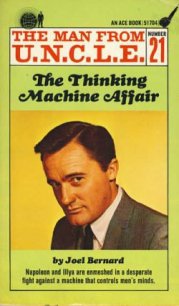The Phantom Tollbooth - Juster Norton (версия книг .txt) 📗
“But power corrupts, and soon I grew miserly and chose fewer and fewer words, trying to keep as many as possible for myself. I had new signs posted which said:

“Soon sales began to fall off in the market. The people were afraid to buy as many words as before, and hard times came to the kingdom. But still I grew more and more miserly. Soon there were so few words chosen that hardly anything could be said, and even casual conversation became difficult. Again I had new signs posted, which said:
“And finally I had even these replaced by ones which read simply:
“All talk stopped. No words were sold, the market place closed down, and the people grew poor and disconsolate. When the king saw what had happened, he became furious and had me cast into this dungeon where you see me now, an older and wiser woman.
“That was all many years ago,” she continued; “but they never appointed a new Which, and that explains why today people use as many words as they can and think themselves very wise for doing so. For always remember that while it is wrong to use too few, it is often far worse to use too many.”

When she had finished, she sighed deeply, patted Milo gently on the shoulder, and began knitting once again.
“And have you been down here ever since then?” asked Milo sympathetically.
“Yes,” she said sadly. “Most people have forgotten me entirely, or remember me wrongly as a witch, not a Which. But it matters not, it matters not,” she went on unhappily, “for they are equally frightened of both.”
“I don’t think you’re frightening,” said Milo, and Tock wagged his tail in agreement.
“I thank you very much,” said Faintly Macabre. “You may call me Aunt Faintly. Here, have a punctuation mark.” And she held out a box of sugar-coated question marks, periods, commas, and exclamation points. “That’s all I get to eat now.”
“Well, when I get out of here, I’m going to help you,” Milo declared forcefully.
“That’s very nice of you,” she replied; “but the only thing that can help me is the return of Rhyme and Reason.”
“The return of what?” asked Milo.
“Rhyme and Reason,” she repeated; “but that’s another long story, and you may not want to hear it.”
“We would like to very much,” barked Tock.
“We really would,” agreed Milo, and as the Which rocked slowly back and forth she told them this story.
6. Faintly Macabre’s Story
“Once upon a time, this land was a barren and frightening wilderness whose high rocky mountains sheltered the evil winds and whose barren valleys offered hospitality to no man. Few things grew, and those that did were bent and twisted and their fruit was as bitter as wormwood. What wasn’t waste was desert, and what wasn’t desert was rock, and the demons of darkness made their home in the hills. Evil creatures roamed at will through the countryside and down to the sea. It was known as the land of Null.
“Then one day a small ship appeared on the Sea of Knowledge. It carried a young prince seeking the future. In the name of goodness and truth he laid claim to all the country and set out to explore his new domain. The demons, monsters, and giants were furious at his presumption and banded together to drive him out. The earth shook with their battle, and when they had finished, all that remained to the prince was a small piece of land at the edge of the sea.
“?‘I’ll build my city here,’ he declared, and that is what he did.
“Before long, more ships came bearing settlers for the new land and the city grew and pushed its boundaries farther and farther out. Each day it was attacked anew, but nothing could destroy the prince’s new city. And grow it did. Soon it was no longer just a city; it was a kingdom, and it was called the kingdom of Wisdom.


“But, outside the walls, all was not safe, and the new king vowed to conquer the land that was rightfully his. So each spring he set forth with his army and each autumn he returned, and year by year the kingdom grew larger and more prosperous. He took to himself a wife and before long had two fine young sons to whom he taught everything he knew so that one day they might rule wisely.
“When the boys grew to young-manhood, the king called them to him and said: ‘I am becoming an old man and can no longer go forth to battle. You must take my place and found new cities in the wilderness, for the kingdom of Wisdom must grow.’
“And so they did. One went south to the Foothills of Confusion and built Dictionopolis, the city of words; and one went north to the Mountains of Ignorance and built Digitopolis, the city of numbers. Both cities flourished mightily and the demons were driven back still further. Soon other cities and towns were founded in the new lands, and at last only the farthest reaches of the wilderness remained to these terrible creatures—and there they waited, ready to strike down all who ventured near or relaxed their guard.
“The two brothers were glad, however, to go their separate ways, for they were by nature very suspicious and jealous. Each one tried to outdo the other, and they worked so hard and diligently at it that before long their cities rivaled even Wisdom in size and grandeur.
“?‘Words are more important than wisdom,’ said one privately.
“?‘Numbers are more important than wisdom,’ thought the other to himself.
“And they grew to dislike each other more and more.
“The old king, however, who knew nothing of his sons’ animosity, was very happy in the twilight of his reign and spent his days quietly walking and contemplating in the royal gardens. His only regret was that he’d never had a daughter, for he loved little girls as much as he loved little boys. One day as he was strolling peacefully about the grounds, he discovered two tiny babies that had been abandoned in a basket under the grape arbor. They were beautiful golden-haired girls.
“The king was overjoyed. ‘They have been sent to crown my old age,’ he cried, and called the queen, his ministers, the palace staff, and, indeed, the entire population to see them.
“?‘We’ll call this one Rhyme and this one Reason,’ he said, and so they became the Princess of Sweet Rhyme and the Princess of Pure Reason and were brought up in the palace.
“When the old king finally died, the kingdom was divided between his two sons, with the provision that they would be equally responsible for the welfare of the young princesses. One son went south and became Azaz the Unabridged, king of Dictionopolis, and the other went north and became the Mathemagician, ruler of Digitopolis; and, true to their words, they both provided well for the little girls, who continued to live in Wisdom.
“Everyone loved the princesses because of their great beauty, their gentle ways, and their ability to settle all controversies fairly and reasonably. People with problems or grievances or arguments came from all over the land to seek advice, and even the two brothers, who by this time were fighting continuously, often called upon them to help decide matters of state. It was said by everyone that ‘Rhyme and Reason answer all problems.’

“As the years passed, the two brothers grew farther and farther apart and their separate kingdoms became richer and grander. Their disputes, however, became more and more difficult to reconcile. But always, with patience and love, the princesses set things right.




